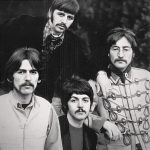Roy Orbison – You Got It


You Got It: A Ballad of Enduring Love by Roy Orbison
In the realm of rock and roll, few names evoke the sheer emotional intensity of Roy Orbison. His soaring vocals, dramatic arrangements, and heartfelt lyrics have earned him the title of “The Big O,” a testament to his enduring legacy as one of music’s most passionate performers. Among his many iconic hits, “You Got It” stands out as a timeless ballad that captures the essence of unwavering love and devotion.
Released posthumously in 1989, “You Got It” was a collaboration between Orbison and his Traveling Wilburys bandmates, Jeff Lynne and Tom Petty. The song emerged from a songwriting session during the Christmas season of 1987, a time imbued with the spirit of togetherness and affection. This sentiment permeates the song’s lyrics, painting a vivid portrait of a love that transcends material desires and worldly concerns.
Orbison’s voice, imbued with a characteristic vulnerability, takes center stage in “You Got It.” He delivers the lyrics with a tenderness that belies the song’s rock and roll roots, imbuing each word with an emotional resonance that resonates deeply with listeners. The melody, a gentle yet powerful ballad, perfectly complements Orbison’s vocals, creating an atmosphere of intimate connection and heartfelt sincerity.
As the song unfolds, Orbison’s protagonist expresses his unwavering devotion to his beloved, declaring that they possess everything he could ever want or need. He sings, “Anything you want, you got it / Anything you need, you got it / Anything at all, you got it, baby.” These simple yet profound words encapsulate the essence of the song’s message, conveying the depth of his love and the unwavering belief in the power of their bond.
The song’s chorus further emphasizes the all-encompassing nature of this love. Orbison repeats, “Anything you want, you got it / Anything you need, you got it / Anything at all, you got it, baby,” each iteration imbued with a growing intensity that underscores the depth of his commitment. The repetition creates a sense of urgency and conviction, as if he is reassuring his beloved of his unwavering support and unwavering love.
“You Got It” concludes with a poignant declaration of love and devotion. Orbison sings, “I live my life to be with you / No one can do the things you do.” These final lines underscore the song’s central theme of unconditional love, a love that transcends time, circumstance, and even the limitations of human expression.
In its entirety, “You Got It” stands as a testament to the enduring power of love. Roy Orbison’s heartfelt vocals, the song’s poignant lyrics, and its emotive melody combine to create a timeless ballad that resonates deeply with listeners of all ages. It is a song that celebrates the transformative power of love, reminding us that true love knows no bounds and conquers all.











